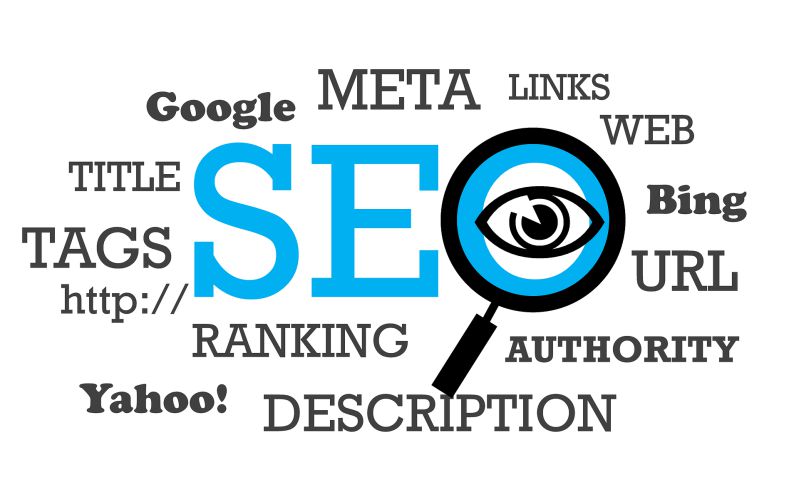Digital marketing is one of the fields that is getting famous day by day and every company is including digital marketing in their to-do list.
Afterall, the audience of almost every company spends time on online platforms. Their journey to buy any product or service begins by a search on Google. So it is a no-brainer to have a strong online presence.
SEO aka Search Engine Optimization is a crucial part of digital marketing that drives most of the traffic.
To quickly define, SEO is the process by which you design and develop your website in a way that it is liked by users as well as the search engines.
If proper SEO is done, your website will be ranked in the top positions by Google and with that, more and more users would visit your website and end up buying your product or service.
These top positions we are talking are search results that appear after searching for any word/keyword in Google. These results are also called Organic results.
Why are these the favorite of webmasters?
Simple, SEO is a non-paid activity i.e. you do not pay anything to Google for appearing in the top organic results.
To add further, the users coming from organic results have an intent of buying your product or service and hence they generate a higher ROI for your business.
One can say that if you do not have organic rankings, you can simply pay Google and show your website on top. True, but this can only happen till the time you have money. And, one of the studies shows that
70-80% of people ignore paid search results, choosing to only click on organic search results.
By this you can get the idea that how important is SEO for any company or individual.
To increase the traffic via SEO, it is important to have a detailed SEO plan in place.
If you already have a website and if your website is not ranking for the most relevant terms i.e keywords, the first obvious step is to conduct an SEO audit that will help you find out the reasons why your website is not ranking in the top results..
Even if your website is ranking reasonably well, it is important to conduct a regular website SEO audit to stay on the good side of Google.
Let’s first discuss what is an SEO Audit?
An SEO audit is a complete analysis of a website that includes the factors that are important for any website to appear in the top rankings on search engine results.
An SEO audit is just like a diagnosis done by any doctor i.e. before giving any medicine, a Doctor examines (conducts various tests) to identify the disease the patient is actually suffering from.
In a similar webs, an SEO audit report will measure your website on each of the parameters that are given weight-age by search engines for ranking.
It gives you an idea about the problems that are preventing your site to rank in the top results of Google .
To add further, after an SEO audit is done, one should be clear about the changes to be done in the website so that the website can hit top rankings.
I think now you get a fair idea about what is an SEO Audit.
Now the next question that may strike your mind is Why you should get an SEO audit done?
There are many reasons to get the SEO audit done. :
- Rankings: One of the most obvious reasons for getting an SEO audit conducted is that your website is not ranking in the search engines. If your website is not ranking, your website would not get traffic/users and hence the online business would be less too.
- Regular Check up: A lot of people see their doctors in spite of being healthy. This is done to ensure that everything is going alright. It is like that idiom “Prevention is better than Cure”. On the same lines, even if your website is ranking well, it is better to get a regular SEO audit conducted and rest assured that your website will keep ranking in the top results.
- Generation Change: You must have heard about new diseases as well as new medicines. If you will ask your doctor or the drug store guy, they will tell you that since the generation has changed, so have the diseases and medicines
In the same way, the search engines change their ranking algorithms and you should keep evaluating and validating your website to know if it is adhering to those changes or not.
I hope I have clarified what is an SEO audit and why one should get the website SEO audit done?
The next question that would come to your mind is “How to do an SEO Audit?”
To make sure I cover all the important points let’s divide the SEO audit into sections.
Objective of an SEO Audit: 
While it will be obvious that any client coming to you will get SEO audit conducted because his/her website might not be ranking but before beginning, we should ask and get as much as information possible. Some of these points are:
- Existing list of Keywords
- Old Keyword Ranking Reports (if any)
- Access to Google Analytics
- Access to Google Search Console
- List of Competitors
Most likely, the client will tell you that the website was ranking in XYZ position earlier for these keywords but now the ranking have dropped.
OR
The client will tell you that they have been doing SEO for some months but their rankings have not improved beyond 20s or 30s.
Check for Existing Penalties
Before you start an SEO audit of your website, you should check if the site is penalized or not by major Search Engine like Google, Yahoo and Bing. You can check this by the following:
- Check the search console for any manual actions. If there are no manual actions it means your site is not penalized by Google.
If you get any manual action message then it is important to resolve the issue to get rid of penalty.
- Another way to check the penalty is through Google analytics.
Login to your google analytics and check the organic traffic pattern and identify any significant change that points towards the penalty.
If you see a sudden drop in the organic traffic then probably you may hit by Google algorithm.
SEO Technical Audit
The main purpose of a technical audit is to make sure that Google can access your website , crawl and index without any issues.
Some of the Technical SEO Audit points on which a website needs to be tested are:
Redirects Set-Ups
We all know that the site can have different versions like
http://example.com
https://example.com
http://www.example.com
https://www.example.com
These versions leads to duplicity and is not recommended by SEO experts and Google.
It is important to use one version from the above mentioned options and for that a 301 redirect should be implemented on the other versions of the URLs.
Once you are done with the 301 setup you can set your preferred URL in the search console.
Mobile Responsiveness
There are many studies that show that the website gets most of the traffic from the mobile. Due to this google has adopted mobile-first indexing policy.
It has become an absolute basic to have a website that works on PC, Mobile phones and tablets.
Not only should the website open on these devices but every functionality should work seamlessly.
For these reasons, Google has started the mobile-first indexing approach and also things like AMP are quite useful too.
If the website is not mobile friendly, leave everything and make your website responsive.
You can check this with the help of https://search.google.com/test/mobile-friendly.
Broken Links
Broken links are extremely frustrating.
Imagine there is a person called Mr. X who makes some effort to locate a shop/store and when you reach there, the gate was closed and you had no clue whether the store will open again or not.
Not only is it bad user experience but it is worst for the store owner. The user that visited the store had an intent to buy and the chances of conversion was really high and just because the store was closed, the chance of that sale was lost.
In fact if the sale was made, there was a possibility of a repeat sale too.
All of this was lost.
In the same way, if this Mr. X visits a page of a website and that page throws a 404 error i.e. doesn’t open, the user loses interest, the website owners loses a potential customer and it’s a lose-lose situation.
Just like Mr. X visits any page, search engines too visits (read crawl) a page and when they find that the page is not present, their effort is wasted.
Now, the question is, will Mr. X visit the store again?
In the same way, search engine crawler would not crawl the page again and if that happens, the ranking of that page will drop and the website owner will see a decline in the traffic.
Technically speaking, your Google analytics will show an increase in the bounce rate and it may hamper the overall stats of your website.
The solution is to first keep the site and up 24×7 and then if there is any reason because of which you have to take your page down, put a notification with a reason.
You can possibly give an option of leaving the phone number or email address so that you can contact the user once the store/page is UP.
Check the Website Speed
We all want our desired results quickly.
When we got to the restaurant, we want our food to be served quickly.
When we order something online, we want that product to be delivered quickly.
When we book a cab, we want that cab to come and pick us quickly.
In the same way, we also expect a page of a website to open quickly.
What happens in any of these does not happen.
We get irritated and the other company might lose business.
All in all, it is a bad experience for everyone.
When it comes to web, Google wants us to load the website quickly so that the users don’t have to wait and they get what they want quickly.
If your website doesn’t load quickly, the users would get impatient and might close and may not revisit your website
Quick loading has become an important quality parameter for Google to differentiate a good vs bad website.
You can use the Google Pagespeed Insights tool to check your speed score.
Here is the link to the tool: https://developers.google.com/speed/pagespeed/insights/
Use HTTPS

We all are aware of the fact that google ranks secure HTTPS websites over the less-secure HTTP ones.
Here is the link to the google article: https://webmasters.googleblog.com/2014/08/https-as-ranking-signal.html
So if you are the one who doesn’t migrated your site to HTTPS then it should be your top priority.
HTTPS ensures that the user information is not leaked during browsing or during transacting on a website. If your website is SSL secured i.e. HTTPS, users will trust your website and so would Google.
Check the Website’s XML sitemap
XML sitemap helps crawler to get all the pages in one place. It gives useful information to search engines such as last update times and priority of pages.
Ideally, every URL that you want to be crawled should be part of your XML sitemap.
After preparing the XML sitemap, submit it via Google search console for Google to read and crawl the URLs.
Check the Robots.txt file
A Robots.txt file tells crawlers what are those pages that crawler should not crawl.
The Robots.txt is the first file that a search engine crawler reads before crawling the pages of any website.
If you have 200 URLs in the system and only 50 are crawl-worthy, it makes no sense to ask Google to crawl all 200 URLs.
At the same time, you also want Google to NOT crawl some of the URLs / sections of your website like /admin, internal search pages etc
Canonicalization
Google hates duplicate content. Having a page with similar content on your website is seen as negative which may affect your SEO strategy.
While you may not do it intentionally, it may happen due to a bad setup.
A lot of times more than one version of a URL is built because of which duplicity happens which is not recommended.
If that happens for any reason, the right canonical tag should be implemented so that the right version of the URL is offered to search engines.
On-Page SEO Audit

The objective of on page SEO should be to ensure that google can understand the content on your website in a better way.
One of the other reasons for on-page optimization is that everything is in your hands and unlike off-page SEO, you do not have to depend on any other.
Let us discuss some of the on-page optimization elements that should be looked into while conducting an SEO audit
Page Titles
Page titles are important factors to consider while doing SEO audit. Page title is nothing but a heading that tells what the story is all about.
Page titles should be unique, meaningful and should cover the important keywords.
Meta Descriptions
Meta description helps search engines to understand the theme of your website.
Just like page titles, meta descriptions too should be unique, meaningful and cover important keywords. Try to keep the length of the meta description to 160-170 characters.
When conducting an SEO audit, one should check if the meta descriptions are adhering to the above points or not.
Heading Tags
Heading tags are HTML tags that are used to identify the headings and subheadings within the content.
If you read any story in a newspaper, you would find a heading and a few subheadings.
Same works for the web as well.
These headings and subheadings should be marked as H1-H6 tags.
From a pure SEO perspective, if these heading tags include keywords, it is helpful.
Image Optimization
There was an old study which said that 1 out of 5 searches that happen on Google are image related.
Also, it is human to see an image of any product before buying it. Because of this reason, E-commerce websites try to include better and more images of their products and services.
Google has introduced image specific XML sitemap as well.
Optimizing images has many elements. Some are:
Is the image loading quickly?
Are the associated elements like Alt tags, image file names descriptive enough?
Is an image-specific XML sitemap created?
When conducting an SEO audit, it is important to check and implement all of these things.
If done properly, your images will rank in image searches and would drive good traffic.
Internal Linking
As the name suggests, Internal links are those links that link one page of a website to another page.
It is one of the important factors to consider in SEO audit. Internal links help search engine to find new content and better understand the content.
It is recommended to make proper use of internal linking with relevant anchor text.
URL Optimization
A URL of any page should ideally say what the page is all about.
After a user searches anything and before clicking on any search result, a user sees the URL of any website and if the URL also tells you what the page is all about, the chances of the user clicking on that result would increase.
When conducting an audit, it should be checked if the URLs are clean and meaningful.
For example:
Good URL: https://example.com/how-to-seo-audit
Not so Good URL: https://example.com/2019-07-08/page-1-2
Content & Page Duplicity
Google is a machine that relates a page with a theme and if it will find the same theme on more than one page then Google will be confused and might not rank your URLs.
Hence, it is extremely important to check if the pages and content are not duplicate and you are not confusing Google with the theme.
Off-Page SEO Analysis
Just to quickly say that everything done for a website which is not on that website can be called as off-page SEO.
In other words, off-page SEO is all about acquiring backlinks for your website and when we talk about off-page SEO audit, we primarily mean auditing the backlinks pointing to your website.
While the on-page SEO elements and in your control and can be handled easily, most of the websites make mistakes in the off-page SEO.
SEO has evolved over the years and the off-page SEO activities done years ago are not relevant today. In fact some of the things can even hurt you.
In the mid 2000s, submitting your website to thousands of web directories was part of every off-page SEO plan.
However, as Google evolved the ranking algorithm, submitting your website to thousands of web directories for acquiring backlinks might not be the best thing to do.
By doing so, you might acquire backlinks from irrelevant websites, niches, locations etc.
Doing so can irk Google and your website might get penalized.
One should check if the backlinks are relevant or not.
Backlinks are nothing but recommendations.
Imagine you are appearing for an interview of a fashion designer’s job and your potential employer asks for a reference.
Now, you have two people who can refer you
- a) A Librarian
- b) A fashion store owner
Whose reference would work out for you and help you get a job?
Obviously option b)
In the same way, Google too wants relevant recommendations i.e. relevant backlinks for your website.
If you get fake and irrelevant recommendations, you will not get a job and in the same way Google will also not rank your website.
An SEO audit checks your backlink profile and will see if the backlinks pointing to your website are doing any good to you or not.
Many years ago, there was no tool for by Google to sort out your bad backlinks and hence Google never penalized any website but after giving the Disavow tool, Google wants you to discard your bad backlinks by using this tool.
If you do not use this tool and have the bad backlinks, Google can penalize a website.
The off-page SEO audit should check the backlinks and make sure they are relevant and natural.
Using a good website audit tool like Ahrefs or SEMrush can be really helpful.
Keyword Mapping
I always think that keyword mapping is one of the important factors that everyone should consider in SEO audit.
Before starting your SEO strategy, it is important to know which keywords to target on which page.
Many marketers don’t consider this in the seo audit and suffers from keyword cannibalization.
Content Analysis
Content is one of the important ranking factors. In content analysis
- Check the content of the website if it is targeting the targeted keywords. Content should be written for users not search engine.
- Content should cover the topic end to end and be informative.
- Check if the content is meaningful and fulfill the user requirement.
- Check if the content is covering the topics that users are searching
Competitor Analysis
No SEO audit gets complete without competitor analysis. You should keep an eye on your competitors. What they are doing, how well they are performing on SERP. In competitor analysis you should consider the following points:
- Number of backlinks
- Competitor dofollow and -nofollow links
- What keywords they are targeting, ranking on and getting traffic?
- How they are writing their content
Wrapping Up
We all know that a successful SEO strategy starts with the successful SEO Audit.
You should be able to find out the issues in your website that are preventing your site from ranking on SERP and resolve them.
Any business owner learns a lot of things after starting the business operations and they keep on auditing their processes and tweaking their strategies because of various internal as well as external factors.
The digital world is quite dynamic in nature and keeps on changing rapidly and considering SEO is one of the integral parts of all digital strategies, a regular website SEO audit is highly recommended.
About us and this blog
We are a digital marketing company with a focus on helping our customers achieve great results across several key areas.
Request a free quote
We offer professional SEO services that help websites increase their organic search score drastically in order to compete for the highest rankings even when it comes to highly competitive keywords.
Subscribe to our newsletter!
More from our blog
See all postsRecent Posts
- 10 Holiday Marketing Tips: Boost Sales & Engagement December 21, 2024
- 10 Common Mistakes Roofing PPC Companies Should Avoid December 19, 2024
- Landing Page Copy That Converts – Secrets Revealed December 16, 2024









Pingback: Best SEO Tools You MUST use in 2023 - Uvisible